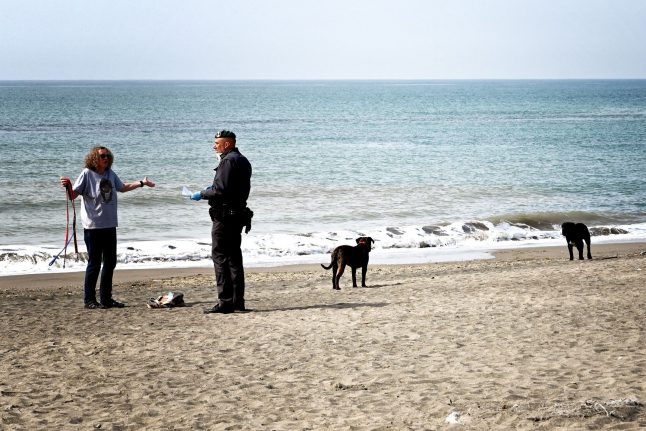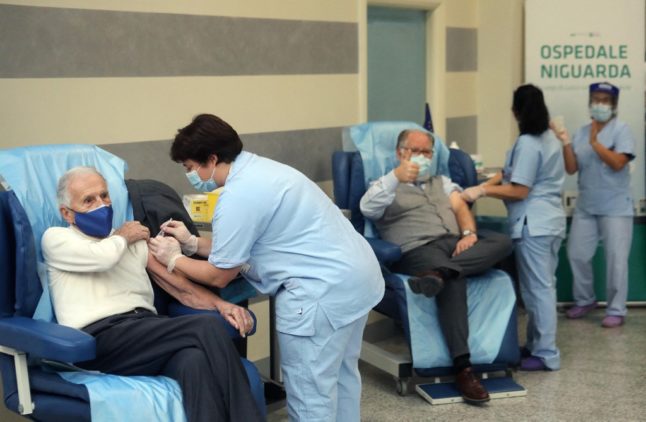Italian authorities announced on Monday that some 90,000 citizens had been charged with disobeying lockdown regulations, and police are checking more than 200,000 people a day.
Nationwide quarantine measures announced on March 9th, and repeatedly tightened since, mean people in Italy are only permitted to leave the house to buy essentials, for health reasons, or to go to work. As of last weekend, there are restrictions on all travel between municipalities unless for “urgent, verifiable work situations”, and emergencies or health reasons.
Measures vary between regions and some have far stricter rules in place. In the worst-hit region of Lombardy, residents are no longer allowed to exercise outside, and dog walking is only permitted within 200 metres of people’s houses.
READ ALSO:
Upon leaving the house, everyone must complete a self-declaration form providing a legitimate reason for travel. Many improbable justifications written on self declaration forms and excuses given to patrolling police have resulted in fines, which can now be up to €3,000.
Italian authorities and the police have shared some of the excuses, perhaps in the hope of deterring other potential lockdown dodgers.

Police checking pedestrians' papers in central Rome. Photo: Alberto Pizzoli/AFP
In Rome, two men had written on the form that they were going shopping. On being stopped by the police, it transpired that they were actually selling drugs. In the same area, two women had stated they were visiting an aunt who was “elderly and sick.” A little digging revealed the aunt was actually a healthy 40-year-old.
Coronavirus quarantine has been interrupting love stories across the country, including one man who left the house in order to win back an ex who had recently broken off their relationship.
On his self-declaration form, the man had written one word to justify his movements: “love.”
Food plays a key role in Italian society, so it’s no surprise that it has featured in some of the excuses. In the province of Bologna, two motorcyclists were caught driving from one town to another, supposedly to buy “fresh eggs” from a farmer. In the Padua area, a man was stopped while trying to enter a red zone, and police found he was under the impression that buying wine was a necessity.
Animals have frequently been employed as excuses to leave the house. The mayor of Fossano, in Piedmont, has described seeing cats taken for walks on a lead, while a young man near Rome reportedly stated he was “feeding the pigeons.”
Among the most common excuses, however, is the “incontinent” dog who, despite seemingly exhausted, is in desperate need of his fifth walk of day.
As Italians near the end of their third week of national lockdown, the strain of staying cooped up at home is beginning to show. However, as the numbers of positive cases and deaths in the country are still rising, authorities are determined to keep the quarantine restrictions enforced. The army has been deployed to patrol in some areas, and police have been carrying out rigorous checks in the streets.
Italian mayors have become an internet sensation after their furious outbursts at those flouting lockdown regulations were compiled into a video. One mayor is recorded saying, “I’m hearing news that some people would like to throw graduation parties. We’ll send the police over with flamethrowers.”
“I stopped him and said, 'Look, this isn't a movie. You are not Will Smith in I Am Legend. Go home.”
This is the updated compilation of Italian Mayors losing it at people violating #Covid19 quarantine. Yes, subtitles are accurate. pic.twitter.com/60V4Csuonb— ? (@protectheflames) March 22, 2020
The mayor of Messina, on the island of Sicily, is meanwhile reported to be trialing the use of drones to ensure citizens abide by lockdown rules. The drone will apparently broadcast the mayor’s voice telling loiterers to go home.
Prime Minister Giuseppe Conte said on March 19th that the lockdown period “will be extended” beyond the previous deadline of April 3rd, however exact details on the length of the extension have not yet been provided.
Rebecca Ann Hughes is a freelance journalist living in Venice. She is the author behind the blog La Brutta Figura, and she has also written for Culture Trip, Prospect Magazine, and International Times. Follow her on Twitter.



 Please whitelist us to continue reading.
Please whitelist us to continue reading.
Member comments